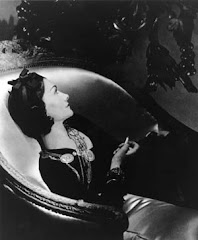There's an interview with me in today's Scotsman newspaper, in which, among other topics, I speak of the readers of this blog:
Grant, who has been interested in clothes all her life, last October even started a blog, thethoughtfuldresser.blogspot.com, as a forum for intelligent discussion. It is subtitled: "Because you can't have depths without surfaces."
But isn't it dangerous, taking fashion seriously? Doesn't she run the risk of being dismissed as frivolous. Is it any sillier than talking about football, a topic near and dear to men's hearts? "Yes, it's identical. And the world wouldn't cease to exist if football ceased to exist; you can live without it, but you can't live without clothes.
"In terms of living without fashion, it's very difficult to find any society which has suppressed the interest in dress and clothing. The Puritans tried it for ten years – a complete failure. So they go to America and try to do it there and again it's a failure. It must be a deep human instinct to adorn the body, to change it through clothing. I would say that it's as central to our nature as a desire for art.
"I wanted to write about clothes the way women think about clothes. It's not the case that if we write about clothes we might as well write chick lit. Judith Krantz wrote the very first books that really talked about labels. She was good at portraying how people got dressed and what they wore at a given moment. I felt it was possible to incorporate that into literary fiction. I felt it was a subject generally neglected by male writers in the 20th century, because it's not manly. But we all wear clothes and most women are interested in them. In this novel clothes are at the centre of absolutely everything and at the heart of the book. It's asking questions about survival and how clothes affect a multitude of situations."
. . .
Her next project is a non-fiction book exploring why clothes matter and why we care about what we wear. To that end, her blog is partly a research tool. Via the comments section, Grant has discovered her readership comprises a highbrow crowd, women who work in embassies, in politics, even someone using a Nasa log-in. This doesn't surprise me at all, being an intelligent, fashion-curious gal myself. I can't wait to read this as-yet-unwritten book. In the meantime, I'll console myself with Grant's backlist.
read the rest



